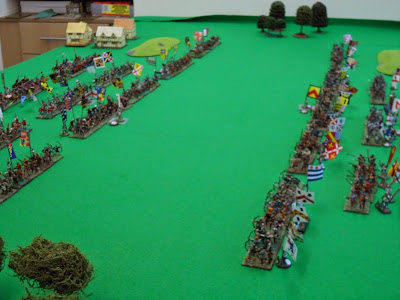First up was 7 Wonders which I played for the first time with the full complement of seven people. It is a cleverly designed game in the sense that it doesn't really take much longer however many players one adds. That's all I have to say about it and I couldn't see why everyone says that the Tower of Babel expansion improves things so much. Mush!Mush! was as much fun as usual; we played for the first time with the buildings and they seemed to work well. Then I finished with a couple of card games: Family Business and Hanabi, in the latter of which we once again failed to organise the firework display.
 |
| Otley in the snow |
The game chez moi was once again cancelled due to bad weather which gave me the usual chance to work out that I was short of the necessary figures. I don't actually have any Wars of the Roses cavalry and needing some for the scenario laid out for a run through of 'For, Lords, Tomorrow is a Busy Day' I have substituted some Imperial forces (as in Sigismund's crusade against the Hussites). However, their light cavalry are of the Cuman horse archer variety and don't work at all. I have therefore invested in three sets of RedBox Scurrers. I'm not so keen on the axe wielding figures as light cavalry, but the others will do nicely.



























